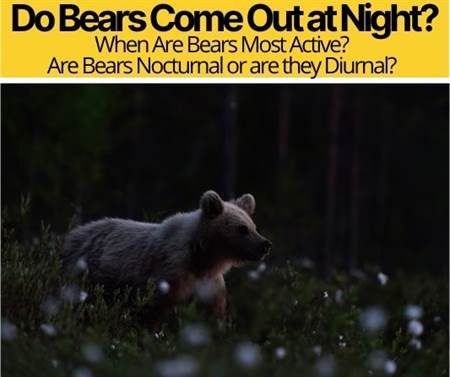 We are all aware (and probably envious!) that bears take a few months out of every year to hibernate. They fill up on food, gather their loved ones, and then they proceed to partake in the world’s longest nap.
We are all aware (and probably envious!) that bears take a few months out of every year to hibernate. They fill up on food, gather their loved ones, and then they proceed to partake in the world’s longest nap.
What about the months in between, though? Do Bears even Sleep During the Night?
If so Where do bears sleep and for How long do they Sleep?
Continue reading to discover all about bear sleep habits.
Do Bears Sleep at Night?
Yes, Bears do sleep at night, bears have specific sleep habits – just like all mammals.
For three seasons, bears go about their normal business, including resuming their typical sleep schedules.
This looks different for various species of bears, and it can even change throughout the year or depending on their habitat.
Depending on the species, bears can be diurnal, nocturnal, or crepuscular.
Diurnal bears would include sun bears, brown bear cubs, American black bears, and Asian black bears. Although, if local human activity is high, the black bears may feel pressured to adapt by becoming nocturnal in order to avoid humans and their intrusive way of life.
Nocturnal bear species include sloth bears and sometimes grizzly bears.
Some bears are crepuscular, meaning they are routinely active in the hours of twilight, or otherwise at dawn or dusk, while the sun is not fully present.
For most bears, their sleeping habits and nap times often revolve around when or where they can gather food, and when it is accessible to them. They do not change their sleep habits for the purpose of avoiding predation, as they have very few natural predators.
Interested in Bear Hibernation? Explore: Bear Hibernation
Where do Bears Sleep?
When bears are not hibernating, they find a variety of areas and scenes to be comfortable enough for sleeping. Some bears seem to be comfortable sleeping just about anywhere, so long as they are not disturbed!
Some places you might catch a bear in slumber are under a tree, underneath fallen trees or in their hollows, in a den, or on a large pile of leaves and brushes.
Even in areas where bears are in close proximity to humans, they will make a bed out of nearly anything! Human accounts have described bears sleeping under their porch, or even on their driveway!
When do Bears Sleep?
As stated, most bears’ sleep habits are determined by when and how they can most easily obtain their food. Because of this, and due to their hibernation schedule, their sleeping patterns fluctuate throughout the seasons.
When winter has come to a close and bears awake from their long hibernation, they’ve lost some weight and energy, so bears need to rejuvenate their strength and body mass. Wide awake and hungry after their longest nap of the year, bears don’t make much time for shut-eye in the springtime.
However, bears love when warm, inviting summer nights roll around, and their activity in the evenings may increase during the hotter season. With elongated days, bears are able to split their foraging and sleeping habits up more evenly, and they rest often in the summer.
Finally, summer winds down, reintroducing colder climates, and then autumn appears. For bears, that means it’s time to stock up for hibernation once again.
Bears can spend up to twenty hours gathering and eating food on a fall day, so they don’t get around to doing much sleeping that time of year. They are far too busy bulking up for the long winter stillness.
How do Bears Sleep?
Mother bears sleep with their cubs. Otherwise, bears almost always sleep alone.
As mentioned, bears sleep in a lot of different kinds of places, and they’ll even sleep in a den that another bear has made. Making a den can take anywhere from three days to a week.
Bears can sleep on their stomach, on their side, or curled up. They can sleep for hours at a time, but they may also take short naps throughout the day.
What do Bears Do at Night
All mammals are born capable of using their eyes in darkness. Bears have especially keen night vision, contrary to popular myth. This is how bears can be nocturnal or switch to nocturnal behavior at will.
Bears engage in different activities in the nighttime including foraging for food, building their den, or even rummaging through your neighbor’s trash!
Do Bears Hunt at Night?
Bears, like humans, can be omnivorous. While foraging for snacks at night, bears certainly won’t pass up the opportunity for meat, but that is not to say that bears go on a typical hunt the way other mammals of prey might.
Rather, bears will hunt or fish if the mood strikes them. They will be especially keen to grab something edible if it comes trodding along, such as a small rabbit.
Brown Bear Sleep Habits
Brown bears have typical sleeping patterns for a bear, if you can call bear sleep patterns typical!
Where they sleep can depend on the location.
Brown bears usually are diurnal. However, they are known to be crepuscular or even nocturnal, especially in locations with a lot of human presence.
Brown bears hibernate, like most bears, and they sleep less in the months surrounding hibernation.
Brown bear mothers actually give birth hibernation, though they aren’t asleep during the event! Cubs are then cared for until spring comes, when the whole bear family can resume activity.
Black Bear Sleep Habits
Black bears are capable of building wonderfully cozy dens or beds for themselves. Living in or near forests and mountainous areas, you can imagine how many ideal places a black bear could find for their slumbers.
By shedding bark, gathering leaves, and making use of other nesting materials, black bears design comfortable spaces that they can use for naps over long periods of time.
Like other bears, black bears can adapt to nocturnal behavior to avoid humans.
Otherwise they are known to wake up earlier than some humans, rising about a half an hour before sunrise. Black bears sometimes stay up a few hours past sundown before it’s time for bed.
Grizzly Bear Sleep Habits
Grizzly bears are massive, so they need a lot of rest! Grizzly bears can be found sleeping in dens made from heavy bedding material such as fallen timber, manufactured burrows, tree boughs or caves.
Though they make their bedding warm and comfortable, grizzly bears start on building a brand new den every year before their hibernation. They rarely return to a den they’ve already used.
These adaptable bears are able to spend their waking hours in the daylight or at nighttime. Contrary to popular belief, grizzlies have no interest in hurting humans, and they’ll stay away from them by adapting to nocturnal lifestyles if people reside nearby.
Polar Bear Sleep habits
A polar bear’s habitat is dark and cold in the winter, so researchers have to rely on the 24-hour-a-day sunlight that arctic summers provide in order to study their sleep habits. Otherwise, they study them in a zoo rather than their natural habitat.
Polar bear activity can increase during nighttime for the purpose of obtaining food. Seals are often found near the ice after hours, giving polar bears proper motivation to be on alert during nighttime.
Polar bears, interestingly, get a similar amount of sleep that humans do, sleeping roughly seven hours out of each twenty-four hour day. Also similar to our habits, it’s typical for them to take one to two hour long naps during the day.
Just like us, polar bears usually take their intermittent naps after a snack or a big meal! It’s typical for mammals to experience lethargy after filling their belly.
Like most other bears, polar bears sleep more in the summer, but not enough to make a large difference in their sleeping habits.
Where do Polar Bears Sleep During the Night?
Polar bears create two types of dens. One is called a maternity den, and it’s what we might picture as a hibernation den for raising cubs. Another type of den polar bears build is called a shelter den.
Shelter dens are built on ice or on land. Their purpose is not for raising cubs, but rather for offering protection to the polar bear and her cubs.
She can also protect her cubs by making beds atop hills that allow her to see if a predator is approaching from afar.
While polar bears can sleep on flat surfaced ice, they prefer digging cozy sleeping pits for themselves, known as day beds. For added comfort, the polar bear will either use its paw or some ice as a pillow.
These day beds are strategically made for the tundra. They provide insulation for the polar bears and can even help them withstand biting arctic blizzards.
How Many Hours Does a Bear Sleep?
During transitional seasons, spring and fall, bears are food-focused. They’ll only sleep about four hours out of the day or night, depending on the species.
In the summer, bears find more time to rest. They may nap more in the summer, though, making their sleeping more intermittent or even sporadic.
Overall, bears get just under the amount of hours of sleep that a human being typically gets.
How Much Do Bears Sleep When not Hibernating?
As you can tell, bears don’t sleep nearly as much when they aren’t hibernating.
In the months leading up to hibernation, bears usually sleep around four hours out of the full day.
This is about the same once the bear wakes from hibernation since it is well rested by then.
in Conclusion
Bears are astoundingly adaptable creatures, and their sleep habits emphasize that. They’re unique too; even their hibernation tactic is atypical and is better defined as a torpor. Unlike authentic hibernation, a torpor is involuntary and shorter lasting.






